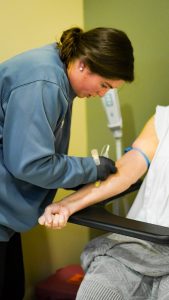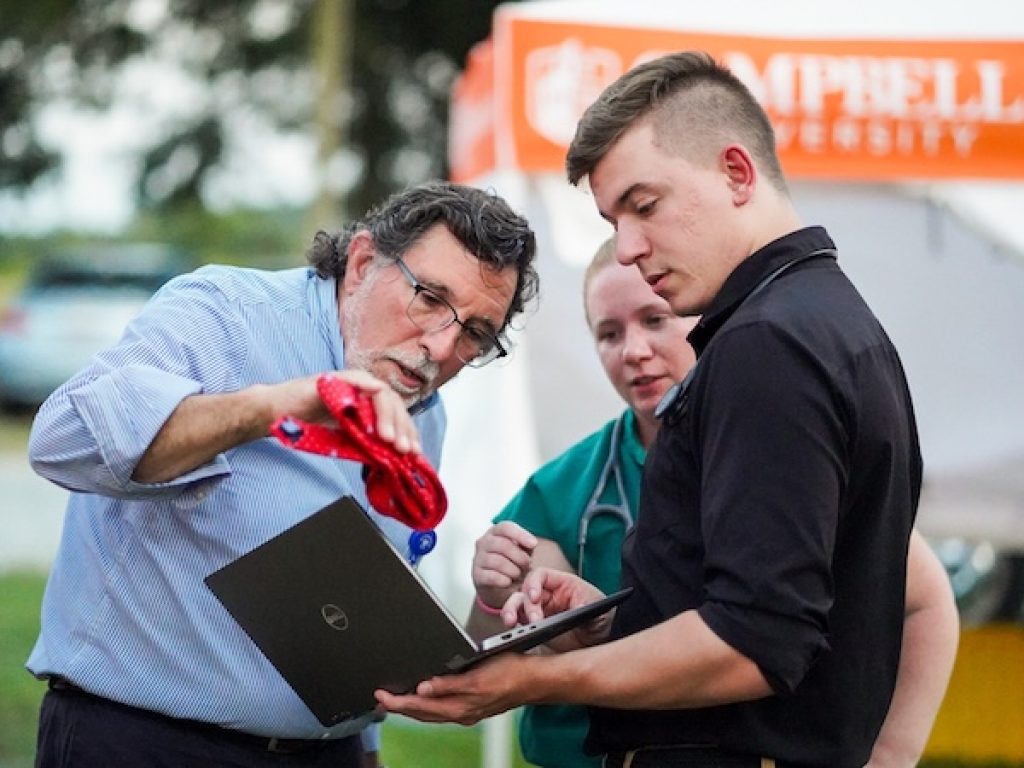The Campbell University Community Care Clinic is funded through myriad grants — including a new one this year — but it also largely relies on private donations and other support, such as fundraising events.
The clinic offers free visits, lab work, imaging and medications to people who would not otherwise have access to health care, on campus and via mobile medical units. The clinic sees only uninsured patients, living at or below 250 percent of the U.S. poverty line.
It’s the only such clinic in the country run solely by students, with some faculty oversight.
Each year the clinic holds a special event to honor student doctors who volunteer, and to raise money. This year, from 2-7 p.m. Sept. 20, the Campbell clinics will hold a carnival, called “A Night Under the Big Top.” The event will be held on the lawn outside Levine Hall and include food trucks, activities, raffles, carnival games, inflatables and more. Adult entry is $35; $10 for children.
Student Dr. Amanda Myers is director of the clinic carnival. She says the clinic is one of her favorite things about Campbell and the reason she chose to attend the Jerry M. Wallace School of Osteopathic Medicine (CUSOM).
 The carnival and the Mr. CUSOM pageant are the clinic’s two major fundraisers. Mr. CUSOM is a male beauty/talent pageant, in which students compete for the crown. Their score in the contest is, in part, based on collected donations. The students typically hold a gala for the clinics but this year students — after seeing another student group host a successful gala event — decided to switch direction.
The carnival and the Mr. CUSOM pageant are the clinic’s two major fundraisers. Mr. CUSOM is a male beauty/talent pageant, in which students compete for the crown. Their score in the contest is, in part, based on collected donations. The students typically hold a gala for the clinics but this year students — after seeing another student group host a successful gala event — decided to switch direction.
“Additionally, because it is so close to the beginning of the academic year, I thought it would be a great way for the new first year students to mingle and interact with each other — the second-year medical students — their families, and even faculty and staff, in a way that is more casual but still focused on Campbell’s mission of serving the underserved,” Myers said. “My hope is that this event will become a staple at CUSOM and one where families and friends gather and co-mingle.”
Food trucks at the event, which also includes games, music and a silent auction, will donate 10 percent of their profits to the clinic.
“I have been collecting items for donation from community businesses and have been pleased with the support from the surrounding business community, but am hopeful that our campus will also come together and contribute what they can to ensure the clinic can continue to provide the kind of care we do,” Myers says.
All proceeds from the carnival will directly help support the clinic, which is equipped with lab testing, a pharmacy and mental health counseling. It also includes visits with medical specialists. Clinic healthcare providers see patients, primarily migrant workers, on campus Monday night. Tuesday, the providers see patients in Dunn, and Wednesday the clinic travels to Duplin County.
Established in 2014 within the med school, the clinic is composed of physicians and physician assistants who oversee teams of medical, PA and pharmacy students.
The clinic gets funding through multiple state grants, including, for example, a recurring grant from the N.C. Department of Health and Human Services/Office of Rural Health, primarily for operational funding. That grant, distributed in three-year blocks, is about $150,000 annually, says Dr. Joe Cacioppo, chair of Community and Global Medicine at the medical school. The grant is based on eligible patient visits.
Additional funding, from the N.C. Area Health Education Centers (AHEC) comes in the form of an Interprofessional Education grant, which has provided startup funds and operational funds for two years at the Campbell medicine clinic in Dunn, which opened to patients this spring.
A ribbon-cutting ceremony for the Dunn clinic are 1 p.m. Sept. 24. The five-room clinic is housed in the Dunn United Ministerial Association, 323 E Broad St.
“The AHEC grant is above and beyond what we get from the state,” Cacioppo says. “The state is our primary operational grant.”
Campbell is also a member of the N.C. Association of Free and Charitable Clinics, one of some 50 throughout the state and the only one entirely run by students. That grant distributes money to the various clinics using a formula that examines how much each site is saving its patients, in lab charges, physicians fees and the like. The Campbell clinic, Cacioppo says, in the past year saved patients about $3 million, resulting in about $115,000 from the N.C. free clinic group.
“Every other clinic is a five-day a week, eight hours a day operation. We’re three nights a week,” he says.
The recurring state grant provides $100 per “eligible patient” visit, which means the patient is uninsured, living at the defined poverty level and has been seen by a licensed physician, physician assistant or nurse practitioner.
The clinic, too, partners with NC Field, the NC Farmworker Program and local health departments to identify and establish relationships with farms employing migrant workers.
This year, starting Aug. 1, the Campbell clinics received a subgrant under the Health Resources and Services Administration Rural Health Care Services Outreach Grant Program. The grant is distributed by NC Field CARES (Community Access, Resilience, Enabling, and Support Consortium).
The project, according to NC Field, is funded by HRSA to expand access to integrated, community-based care for rural underserved populations, particularly those who are uninsured, medically vulnerable, lack access to social determinants of health resources, agricultural workforce and family members.
The grant is $24,120 annually, through July 31, 2029 and totals $96,480.
Two years ago the Campbell clinic saw 1,589 patients, which is 89 patients more than the defined limit, according to the grant. Last year, the clinic saw some 1,670 patients, about 170 over the prescribed threshold.
“Without your support, we can’t go forward,” Cacioppo said during last year’s gala.
“These fundraisers fill the gap for us, so that we’re able to provide that care. It really speaks to the heart of the school, and especially to the heart of the students in wanting to serve. That’s why this is so essential. Without this sort of thing, without the money we’re able to generate from these events, we wouldn’t be able to function.
“We depend on it,” Cacioppo said.
In 2024, the Campbell University Community Care Clinic earned the 2024 Gold Rating for Quality Standards Program from the National Association of Free & Charitable Clinics. The clinic achieved the highest scores in categories that included patient care, clinic and pharmacy responsibilities, risk management systems, credentialing and privileging systems and administration as it delivers crucial healthcare services in Harnett, Duplin, Johnston and Sampson counties in eastern North Carolina.

